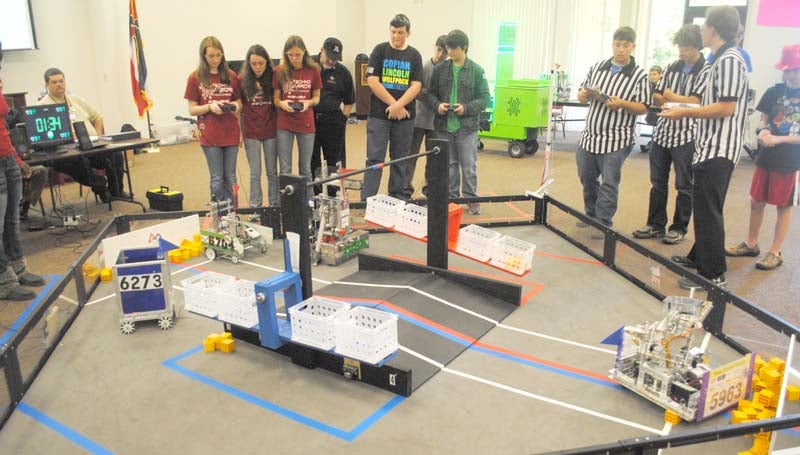High Tech Challenge: Area teens put their robots into competition
Published 10:44 am Friday, November 15, 2013

THE DAILY LEADER / JUSTIN VICORY / High school students from Southwest Mississippi take part in a 10-team qualifying robotics competition, known as the First Tech Competition, or FTC at Copiah-Lincoln Community College Saturday. The top three teams will go on to compete at the state level in Oxford Feb. 8.
As football stadiums across the state filled up with fans and family wearing favorite team colors, a whole other kind of competition was going on at Copiah-Lincoln Community College Saturday. Here, too, teams were locked in battle, wearing their uniforms and passionately cheering on their respective team members.
Saturday at the Co-Lin, it was playoff time for high schools and organizations participating in the First Tech Challenge, a robotics competition held at the Thames Center. The competition was the pre-qualifying round for an upcoming state competition and also represented the culmination of months of coordinated effort and teamwork by high school-aged contestants from the area. Future rocket scientists, computer programmers, mechanical and electrical engineers, or those just interested in testing the mind and applying that knowledge to a workable electronic extension of themselves took part in the all-day event.
“It’s a mechanical challenge. It’s an electronics challenge. It’s an engineering challenge,” said Mannie Lowe, FTC volunteer and program manager for the Center for Math and Science Education at the University of Mississippi.
“It involves communication and direction. In the end, it’s a mental chess game,”
At the event, contestants stood around a partitioned-off arena with a set of balancing scales at both ends. The goal of the competition was for the contestants to command their robots to pick up and unload as many plastic Lego-like blocks as possible into baskets on top of a board resting about a foot above the ground like a swaying pendulum.
Point scores were calculated by the particular location of the block drop; if the team dropped a block into a basket towards the far end of the board, they are awarded more points. The goal was to score as many points as possible while ensuring the beam stays balanced.
Within these contest parameters, there were three sub-challenges. For the first 30 seconds, the team could not manually control their robots. Every move the robot made must be pre-programmed. This, which was by far the most challenging part of the competition, yielded few points for contestants.
The second part of the competition allowed teams to control their robot’s movement manually through the use of game control pads. This went on for one full minute.
Finally, the last part of the contest challenged teams to maneuver their robots to either attach to an extended metal bar in the center of the arena, or to raise a flag operated by rotating a PVC pipe extension.
Contestants stood around the arena’s edge impatiently at times, seemingly trying to move the robots by telekinesis when the machines wouldn’t obey their commands.
Almost inevitably, all robots end up breaking down at some point throughout the competition. But what can elevate the winners to the championship round is their ability to diagnose the problem and to adapt to the circumstances on the fly.
“Much of this is thinking on your feet,” said Lowe. “The FTC contest also teaches the participants the ability to apply communication, leadership and management skills among a team setting,” Lowe continued.
By contest’s end, two of the three teams slated for advancement to the state finals happened to be from Lincoln County. The “Bionic Mafia” from Enterprise Attendance Center and the “Stingbots” from Loyd Star received top honors, and will now prepare their machines for the state competition in Oxford Feb. 8.
Other award winners included:
• Winning Alliance Captain – Hartfield Academy.
• Finalist Alliance Captain – Advanced Central Mississippi Robotics
• Finalist Alliance Team – West Lincoln Attendance Center
• Connect Award – West Lincoln Attendance Center
• Rockwell Collins Innovate Award – Hartfield Academy
• Motivate Award – Enterprise Attendance Center
Co-Lin math and science instructor and FTC volunteer Kevin McKone said, “These challenges educate kids on manufacturing and design, something we as a society have largely lost. The resources we have on campus – including Co-Lin’s machine shop, the electronics department and our drafting and design facilities can do a lot. These facilities can turn kids’ ideas into a fully functioning work of art,” McKone said.
“That’s what these final machines end up becoming – works of art.”
In the summer, McKone also holds a Robotics Camp for fifth-through-seventh grade students from the area.
Eddie Melton, the volunteer field technical advisor at the FTC competition, has seen an increase in growth the last few years. “Two years ago we had only four FTC teams in the entire state. This year we have 40 teams,” said Melton.
Despite the larger than expected turnout, McKone looks forward to next year’s FTC competition.
“This year’s event ran as smoothly as I could have imagined. I owe this all to the volunteers, many of whom have traveled across the state to be here. I am already excited about what we will see next year,” McKone said.
The cost of the FTC competition is $275. This pays for team registration, equipment and related programming software. The fee includes a laptop and/or a training coach if necessary.
Last year, participants programmed a robotic device to throw Frisbees through a tight window. Next year, expectations are that FTC organizers will come up with something equally as unique, said McKone.

